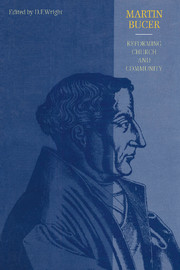Book contents
- Frontmatter
- Contents
- Notes on contributors
- List of abbreviations
- Introduction
- 1 Martin Bucer and the Old Church
- 2 The relation between church and civil community in Bucer's reforming work
- 3 Bucer's influence on Calvin: church and community
- 4 The church in Bucer's commentaries on the Epistle to the Ephesians
- 5 Church, communion and community in Bucer's commentary on the Gospel of John
- 6 Eucharistic communion: impulses and directions in Martin Bucer's thought
- 7 Martin Bucer and the ministry of the church
- 8 Infant baptism and the Christian community in Bucer
- 9 Bucer's ecclesiology in the colloquies with the Catholics, 1540–41
- 10 The Strasbourg Kirchenpfleger and parish discipline: theory and practice
- 11 Ecclesiological motifs behind the creation of the ‘Christlichen Gemeinschaften’
- 12 Martin Bucer in England
- 13 Martin Bucer and the Englishing of the Psalms: pseudonymity in the service of early English Protestant piety
- Bibliography
- Biblical index
- Index of Bucer's works
- Index of modern authors
- General index
13 - Martin Bucer and the Englishing of the Psalms: pseudonymity in the service of early English Protestant piety
Published online by Cambridge University Press: 22 September 2009
- Frontmatter
- Contents
- Notes on contributors
- List of abbreviations
- Introduction
- 1 Martin Bucer and the Old Church
- 2 The relation between church and civil community in Bucer's reforming work
- 3 Bucer's influence on Calvin: church and community
- 4 The church in Bucer's commentaries on the Epistle to the Ephesians
- 5 Church, communion and community in Bucer's commentary on the Gospel of John
- 6 Eucharistic communion: impulses and directions in Martin Bucer's thought
- 7 Martin Bucer and the ministry of the church
- 8 Infant baptism and the Christian community in Bucer
- 9 Bucer's ecclesiology in the colloquies with the Catholics, 1540–41
- 10 The Strasbourg Kirchenpfleger and parish discipline: theory and practice
- 11 Ecclesiological motifs behind the creation of the ‘Christlichen Gemeinschaften’
- 12 Martin Bucer in England
- 13 Martin Bucer and the Englishing of the Psalms: pseudonymity in the service of early English Protestant piety
- Bibliography
- Biblical index
- Index of Bucer's works
- Index of modern authors
- General index
Summary
The evolution of the English Bible is a complicated story. If not without its heroic figures like William Tyndale and steady workmen like Miles Coverdale, it is more typically the tale of a number of relatively obscure personages working alone or in committee in a process of translation and revision that spanned the better part of a century until the appearance in 1611 of the so-called Authorized Version. To this story Martin Bucer of Strasbourg made some contribution, in particular in the earliest period of English Protestantism, when portions of his 1529 Latin Psalms commentary were twice put into English, by George Joye and again by John Rogers, in a series of pseudonymous publications during 1529–37. Joye has been the subject of an excellent study by C. C. Butterworth and A. G. Chester, and the first edition of his Psalter of David is available in reprint; while Rogers's translations of Bucer were observed with considerable documentation by Constantin Hopf. This essay will examine the way in which both Joye and Rogers used the work of the Strasbourg Reformer, within the context of the originality of Buser's own exegetical endeavour.
There were not lacking persons in England who were stirred by Erasmus' clarion summons in the 1515 Paraclesis to give the Christian laity of Europe access to the philosophy of Christ in their own tongue: ‘I wold to god the plowman wold singe a texte of the scripture at his plowbeme, And that the wever at his lowme with this wold drive away the tediousnes of tyme.’ But English conditions differed from those on the continent.
- Type
- Chapter
- Information
- Martin BucerReforming Church and Community, pp. 161 - 175Publisher: Cambridge University PressPrint publication year: 1994
- 1
- Cited by



